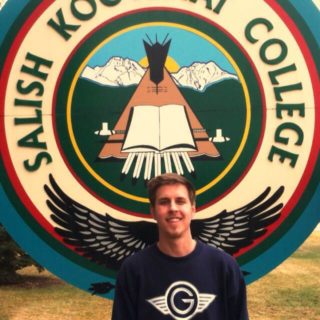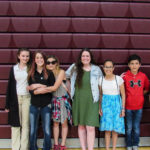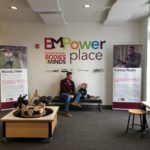CHECKING IN WITH MTCC VISTA SAM GARETSON
 |
| Sam Garetson serves with Salish Kootenai College |
Sam Garetson has had a lot of success since he started as a VISTA this past January. He currently works from Salish Kootenai College with with the Upward Bound office, helping open the doors to postsecondary education wider to more first generation and low income Montanans. Recently, we decided to check in with him. This is what he had to say:
 |
| AmeriCorps VISTA Sam Garetson (pictured far right) with fellow instructors and students participate in Bob Marshall Wilderness trail restoration as part of Upward Bound’s summer program. |
My day typically starts with me checking emails. Since that lasts a whopping five minutes, I have a lot time to spend on my primary function, which is to research and create sustainable programs and curricula to be used by Upward Bound (UB) in improving communication and empowerment of our students. By the end of the day I have a pile of post-it notes, scratch printer paper, and more ideas than I know what to do with. I spend subsequent days making sense of the previous day’s research, tending to the ideas that work and throwing out those that don’t. Throughout the summer, I piloted student assessment tools that could assist UB in improving student academic success by paradoxically going beyond mere academic evaluations and focusing on character development. My research has spawned a multi-faceted teaching tool that hopes to build on characteristics of grit and resilience, essential to a student’s investment in learning. The long-term goal is to maintain an instructive system that supports the actualization of self-awareness and empowerment for our students.
 High School is hard. We often look back on that time, frustrated at our lack of understanding of the bigger picture, wishing we had known then what we now know. The motivation to work with underprivileged students to expand their internal and external life horizons comes from this perspective. Upward Bound is a college preparatory program administered by the government, sure, but to make it effective requires forward thinking. Students need more than a manufactured roadmap to get them to and through college. We have a responsibility to meet our students where they are individually in order to facilitate a deeper ecology of self that will help them become resilient, aware, ethical persons. Working from this mindset brings the student back into the equation allowing us to address the web of personal experiences that effect academic success.
High School is hard. We often look back on that time, frustrated at our lack of understanding of the bigger picture, wishing we had known then what we now know. The motivation to work with underprivileged students to expand their internal and external life horizons comes from this perspective. Upward Bound is a college preparatory program administered by the government, sure, but to make it effective requires forward thinking. Students need more than a manufactured roadmap to get them to and through college. We have a responsibility to meet our students where they are individually in order to facilitate a deeper ecology of self that will help them become resilient, aware, ethical persons. Working from this mindset brings the student back into the equation allowing us to address the web of personal experiences that effect academic success.Working at the University of Montana (and MTCC Network Office) as a VISTA leader and supporting new, wide-eyed VISTAs sounds pretty plush. An alternative route would be to pursue a joint master’s program incorporating Peace Corps service and cultural ecology or who knows. In a beautiful way my goals are adaptable. AmeriCorps, and the environment it placed me in, has taught me humility and contentment in the process. Ultimately, losing myself in this process of serving others will be my own selfish life reward.
Thanks for your service, Sam!
 Campus Compact Blog
Campus Compact Blog 
